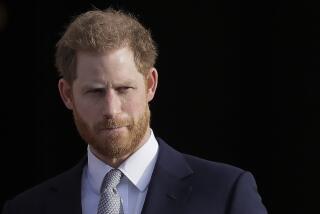Rupert Murdoch sorry about phone hacking but is also defiant
LONDON — By turns contrite and defiant, media magnate Rupert Murdoch on Thursday apologized for the phone-hacking scandal that has tarnished his company but then blamed subordinates for covering up the problem and police for failing to investigate it properly.
“The buck stops with me,” Murdoch said. “I failed. And I’m very sorry about that.... It’s going to be a blot on my reputation for the rest of my life.”
Had he known the extent of hacking by the News of the World tabloid, he would have “torn the place apart, and we wouldn’t be here today,” Murdoch testified on his second day before a British judicial inquiry on media ethics, which was spawned by the hacking scandal.
Yet the Australian-born tycoon acknowledged that, as chairman of media giant News Corp., he hadn’t bothered to delve into the issue himself when evidence of wrongdoing began emerging as early as 2006. Then, when the scandal erupted last summer with revelations that the cellphone of a kidnapped girl was among those hacked, he shut down the 168-year-old News of the World in a rush of fear.
“You could feel the blast coming in the windows,” Murdoch, 81, said in a London courtroom.
“I panicked. But I’m glad I did,” he said.
“All I can do is apologize to a lot of people, including all the innocent people in the News of the World who lost their jobs.”
Three criminal investigations have been launched as a result of the scandal; Scotland Yard says hundreds of people may have been the victims of illegal snooping by the News of the World. Dozens of journalists from the defunct paper and its sister tabloid the Sun have been arrested, although none has been charged.
Murdoch said he has spent “hundreds of millions of dollars” on the legal fallout and on cleaning up his newspapers to make sure such lapses don’t happen again. He expressed dismay that News International, the British arm of News Corp., had been obstructive during the investigation and blamed misguided employees within the News of the World.
“There’s no question in my mind that maybe even the editor, but certainly beyond that — someone took charge of a coverup which we were victim to and I regret,” he said. He denied that the coverup went up to the highest echelons of News Corp.
News International has had to fight off allegations that it tried to destroy emails and other evidence of widespread phone hacking and other illegal news-gathering methods, such as paying public officials for information. Many critics say those practices would still be going on if not for the expose in the Guardian newspaper on the hacking of the missing girl’s phone.
The scandal has focused attention on the power of the news media in Britain, particularly of Murdoch’s bestselling tabloids. Politicians of all stripes have eagerly sought Murdoch’s favor, in part because they feared having their private lives and peccadilloes paraded on the papers’ front pages.
On Wednesday, during several hours of relatively even-keeled testimony, Murdoch contended that his political influence was overstated and that he had never tried to use it to advance his considerable business interests.
On Thursday, he was in a more combative, sometimes peevish mood, taking swipes at the BBC, the Guardian, rival media barons, unflattering biographers and the inquiry’s lead counsel.
When the lawyer, Robert Jay, prefaced a pointed question with the comment “some people might say,” Murdoch snapped, “People like you.” He quickly said he wished to withdraw the remark.
Later, after Murdoch said that a “you scratch my back, I’ll scratch yours” philosophy was prevalent in journalism and other spheres, Jay reminded him of his previous testimony about never having used his political contacts for commercial gain.
“I don’t ask any politicians to scratch my back,” Murdoch responded, then said, “No, I’m not falling for it.”
To the wonderment of many of his listeners, he defended the tabloids in his media stable by saying descriptions of them as purveyors of titillation and gossip were “vastly exaggerated.”
The Sun and the News of the World are notorious for their sensational, often intrusive stories about celebrities, politicians and other famous people. Murdoch sought to characterize the titles as nobler publications dedicated to promoting the public good, without explaining why the Sun features a different topless model every day.
Lips also curled when he complained of being besieged by photographers last year during the height of the hacking scandal, treatment his papers routinely dish out to others.
He acknowledged, “It’s part of the game.”
More to Read
Start your day right
Sign up for Essential California for news, features and recommendations from the L.A. Times and beyond in your inbox six days a week.
You may occasionally receive promotional content from the Los Angeles Times.







